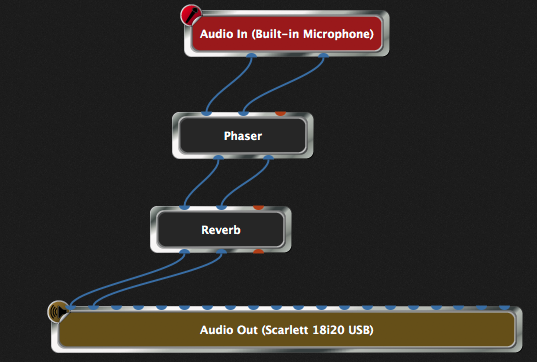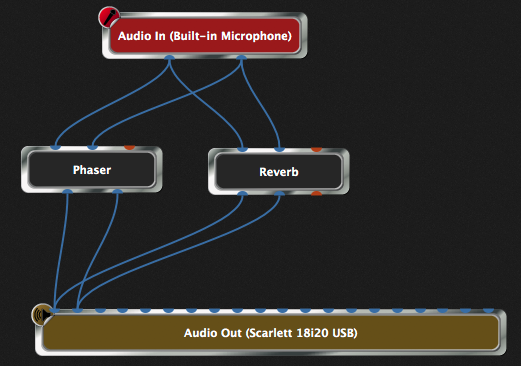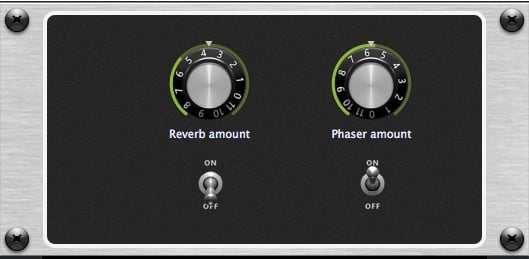The short answer is we needed it ourselves! The long answer is, well, much longer, so read on.
Although I was using various MIDI sequencers and DAWs since the 80s, I only got back into live performance about nine years ago. As a Mac user I was naturally drawn to Apple MainStage, which, at the time, I felt was going to be just perfect for me. At the time, I was still doing the Rick Wakeman/Keith Emerson thing. You know, surrounding myself with about 9 keyboards including a Korg Oasys, a Prophet 8, a Moog Voyager, a twin-manual Hammond clone and various MIDI keyboard controllers.
However, I soon ran into some very bizarre problems with MainStage, the details of which are beyond the scope of this article but suffice it to say that I just couldn’t get things to work reliably the way I needed.
My next approach was to implement MainStage functionality using MaxMSP version 5 from Cycling74. I wrote a 3-part article about how I did this which you can read on our old blog page. It was an ongoing project and it worked sufficiently well that I went on tour several times with that environment. Unfortunately, newer versions of Max were becoming much less reliable and I was forced to stick with MaxMSP version 5 even though newer versions had some really cool features, particularly editing related, that would have been really helpful. A bigger problem was that VST support in MaxMSP was becoming problematic and unreliable, at least for the ways in which I needed to use them.
So like coming to a fork in the road, I had to make a choice. There weren’t really very many options. One of the better known, Ableton Live, was interesting, but in spite of its name, it really wasn’t focused on live performance the way I needed it to be, being more song oriented than show oriented. There were a couple of options for Windows only, such as Forte and Cantabile but frankly, I couldn’t even figure out how to get started with either of them. Incidentally, a consequence of this is that somebody else had to create audio plugin host comparisons for Gig Performer vs. Forte and Gig Performer vs. Cantabile comparisons. I’m sure someone will do Gig Performer vs. Camelot Pro, Gig Performer vs. Rack Performer, Gig Performer vs. Unify and Gig Performer vs. Live Professor comparisons as well.
Here’s a critical insight. I have a serious technical background in software development but when I am in “music mode”, I don’t WANT to have to care about techie stuff. It needs to just get out of my way. If you sit down at a piano or pick up a guitar and start playing, you don’t get distracted by the mechanics of the piano or guitar, you just play. You can focus on creativity.
So, along with my partner, an extremely strong software developer but also a touring guitarist, we decided it was time to create our own audio plugin host that would do exactly what we wanted. We are both touring musicians and so rather than just having an abstract understanding of the needs of performing musicians, we’ve both been (and still are) there. One important issue that never seems to be addressed by developers of audio plugin hosts who don’t actually perform live is the rapid need to diagnose the origin of a problem when you’re on stage. If the sound in your monitors stops suddenly, you really want to know fast whether it’s your hardware, your software, or something wrong with monitoring or FOH.
Some key goals were:
- Reliability – If you’ve ever been on stage fretting that your system was going to crash “any moment now”, you’ll immediately understand this one. I want to enjoy the performance and not always be on edge that something might go wrong. You should not have to worry that moving a slider might break something.
- Usable by regular people – This is the main reason we went with a visual approach rather than using the traditional channel-strip approach. Recording and mix engineers are used to working with channel strips but who the heck wants to deal with busses, aux channels, inserts when you just want to connect your guitar to your reverb or phaser (or both)!
- Unobtrusive – Nothing should get in the way of your performance and your creative juices. If you have to stop and think about the mechanics of what you’re doing, you’re immediately distracted from your primary goal.
- Keep growing – Gig Performer was originally released in December 2016. Its feature set was driven by our experiences on stage. Our updates include not only our own ideas for improvements but also functionality based on on feedback from our growing community user base, many of whom are either touring or session musicians, some rather well known.
.
If you are a guitarist and you want to feed your guitar into a phaser and then into a reverb, it should be (and is) as simple as building this:

If you want to route your guitar to your phaser and to your reverb at the same time, then just change your connections to look like this.

In either approach you can then easily create a front panel to control the amount of reverb and phaser or turn them on or off and then control them from a pedal board. Yes, we have knobs that go to 11!

The plugin routing and panel displays shown here are examples of what might be in a single rackspace in Gig Performer. You can have many rackspaces, each of which can have a completely different set of plugins and front panel designs. You can switch from one to another, even in the middle of a beat with no glitching.
Why we don’t include many plugins
One question we are asked from time to time is why we don’t include many plugins such as synths, effects, samplers, midi processors and so forth in Gig Performer. While we may include some plugins to get you started with our templates, we have three main reasons for this decision:
- Availability of free plugins: A tremendous number of free and astonishingly functional high-quality plugins are available from many sources. For example, just visit such well-known websites like those presented in our blog article for up to date lists of free high-quality plugins. Then there are companies like Melda Production, Voxengo, and U-He all of which have an amazing collection of free plugins available along with commercial products. If you have (or get) a subscription to the great magazine Computer Music, you get access to an entire suite of highly rated free plugins.
- Industry standard commercial plugins: Perhaps even most importantly, most serious users will want to use some industry standard plugins and/or will want functionality that is generally not included with other audio plugin hosts. For example, the NI Kontakt 5 sampler is extremely popular due to its flexibility and the huge number of available libraries. Guitar Rig, also from Native Instruments is a great effects processor for guitarists. Many famous plugins such as Omnisphere, Keyscapes, Serum, Lounge Lizard, M-Tron Pro become staples for keyboard players. Guitarists will be extremely interested in using the S-Gear or Overloud products for creating their unique sounds. Drummers will be interested in such products as Superior Drummer. There are many other examples of course.
- Avoiding lock-in: Our third reason is not limited to Gig Performer users but is rather an observation about using proprietary plugins and “lock-in”. Suppose you build your environment (for studio and/or for live performance) using an application with proprietary plugins. Now you need to share your work product with a third party (e.g, another producer, engineer or performer). If they don’t have your identical environment, you’re all out of luck! Consider also what happens when a new “must-have” audio plugin host is released. You won’t be able to use any of your proprietary plugins with it so again, you’re locked out.
- (Update – June 2021 – Gig Performer 4 does in fact include a few plugins developed by other vendors and distributed with their permission. We did this so that new users who are unfamiliar with the concept of plugin hosts and plugins would not have to start looking for and downloading plugins just to get started)
.
For all of the above reasons, we chose to focus on overall functionality, plugin management, reliability and features that a live performer will need to leverage whatever plugins they want to use.
There are various documents and videos on our support page (http://gigperformer.com/support.html) which we encourage you to review, even though it’s not particularly hard to figure out Gig Performer without a user manual. The reason to look at these documents is so that you can very quickly get a sense of the capabilities of the program as you’re getting started.
Beyond the basic functionality which addresses the needs of the majority of performing and session musicians, Gig Performer also has some very advanced features such as a full OSC implementation for both remote control and for interaction with other audio applications such as Ableton Live. It also has a built-in super-fast programming language, GPScript which lets you create some very powerful workflows and you can even create plugins that can manipulate MIDI, respond to and send OSC messages and perform many other functions.
Our community forums are where you will be able to interact with other users, find out about interesting techniques and maybe, just hang out.
Gig Performer® runs on both Windows and Mac platforms. If you are a guitarist, keyboard player, bass player, vocalist, drummer, or a FOH live sound engineer, I encourage you to check out Gig Performer through our 14-day fully functional free trial. The product is well supported through our knowledge base, community forums and there are even real live people you can call in the unlikely event that you have a problem.
Enjoy!
David Jameson, Ph.D.
Co-founder, Deskew Technologies, LLC
Keyboards and Eigenharp: The Security Project, Beyond The Wall, Reelin’ In The Years
.
Related topics:
– Gig Performer is used by professional and well-known musicians all over the World
– How does Gig Performer compare to other audio plugin hosts?
– Music software has failed live performers.
– Gig Performer is the best companion for all your musical efforts and more
